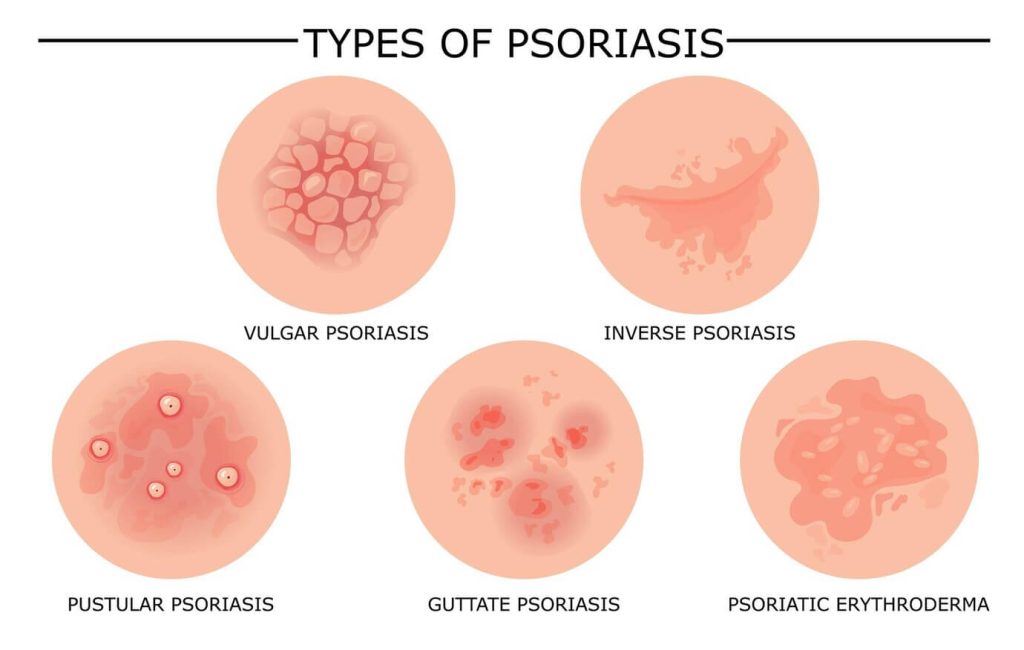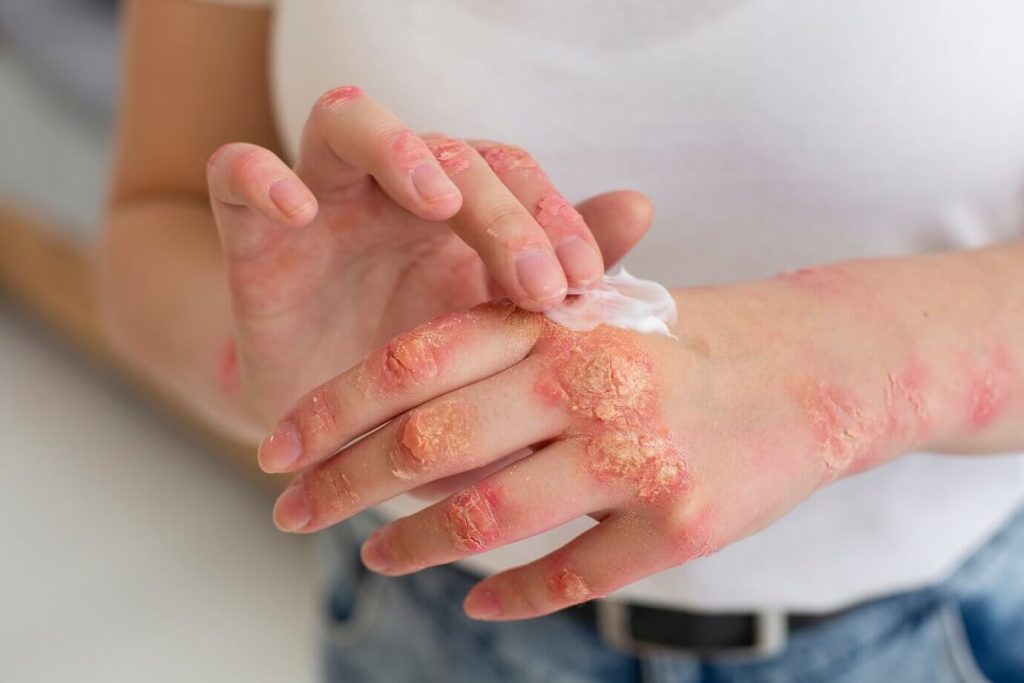Your skin becomes dry flaky and itchy when you have eczema on face. Skin sensitivity to allergens and irritants can result from eczema because it impairs the normal function of your skin’s protective layer. For facial eczema there is no known cure, however, there are treatments that can lessen symptoms.
Eczema On Face
These skin conditions collectively are known as eczema and they cause itchy irritated skin. Your doctor may refer to it as dermatitis as well. It compromises the function of your skin barrier keeping you safe from the elements and promoting moisture retention. This implies that allergens and irritants in your surroundings may cause your skin to react more quickly.
Although eczema can appear anywhere on the body it most frequently affects the face, particularly the forehead cheeks lips and chin. Additionally, it could get in and around your ears. You can have any kind of eczema on face. But the most common ones are contact dermatitis seborrheic dermatitis and atopic eczema. Furthermore, multiple types of eczema can occur simultaneously.
Eczema Signs On The Face
Anywhere from your chin to your forehead on your face, you could develop eczema patches. However, the most frequent location for flare-ups is your cheeks. The following are typical signs of facial eczema:
• Irritation (inflammation) swelling and redness.
• A skin-colored rash that can be red purple or dark brown depending on your skin tone.
• Skin rashes.
• Skin that is scaly flaky or dry in spots.
• Blisters or little bumps.
• Under your eyes, you have wrinkled skin.
• Skin irritation or discomfort. many forms of facial eczema.
Eczema Comes In A Variety Of Forms
Several types are frequently seen on the face.

Eczema Atopic
This is the most popular eczema type. Many people experience it for the first time as young children. Those who get it also frequently have close relatives who suffer from asthma hay fever or atopic eczema. In infants and toddlers up to the age of two years, atopic eczema typically appears on the cheeks.
After your child is weaned it might also show up around the mouth. It can appear on the eyelids of slightly older children particularly those with hay fever. The eyelids or the area surrounding the lips are typically affected when adults or teenagers have atopic eczema on their faces.
Additionally, you might develop a second skin fold beneath your eye and notice a darkening of the skin around your eyes. Given how frequently your face comes into contact with allergens and irritants flare-ups of atopic eczema on your face may be linked to contact dermatitis.
Seborrheica Dermatitis
One of the most prevalent forms of eczema on face in adulthood is this one. It produces greasy scales and itchy red patches on your face particularly on your forehead in the creases beside your nose in the brows and behind your ears. Your scalp can develop crusty or powdery white or yellow flakes.
Contact Dermatitis
Eczema or contact dermatitis is a skin condition that develops when an allergen or irritant comes into contact with your skin. Your lips eyelids and cheeks are frequently affected when you have contact eczema on face. Skin care products or makeup containing ingredients you are allergic to like dyes and perfumes may be the cause. reasons behind facial eczema.
What Specifically Causes Eczema On Face?
Doctors are unsure of the precise cause of eczema. However, they believe that your environment and genes interact. People with allergies asthma or eczema in their family or on their own for example frequently have a history of these conditions. The causes of an eczema flare-up can vary from person to person. Eczema on the face is frequently brought on by:
• Cleaning products and soaps.
• Extremely dry air or low relative humidity.
• Getting in touch with an allergen.
• Cosmetics.
• Particulates such as smoke.
• Frizzy or scratchy materials like wool.
• Psychological stress.
How To Treat Eczema?
The condition known as eczema is incurable and sporadic. What causes your flare-ups will frequently determine the best course of action. To identify your triggers and prevent them your doctor will collaborate with you. Your doctor may advise you to manage your symptoms in the following ways when you experience flare-ups:
Application Of Steroid Creams To The Skin

They are essential to the management of eczema. Hydrocortisone eczema cream for face available without a prescription can alleviate red itchy skin. For a few weeks apply it once or twice daily. You might need a stronger prescription steroid if that isn’t effective enough. Because it can thin your skin use it sparingly.
Try Using A Calcineurin Inhibitor If Steroids Are Ineffective
Instead of a steroid cream, your doctor might prescribe these. Inhibitors of calcineurin prevent some chemicals that can cause your eczema to flare up. In particular, they are used to treat eczema on the face specifically on the skin folds neck and eyelids.
Try Phototherapy
If cream medications haven’t worked and your eczema is moderate to severe this might help. Remember that having this kind of treatment for an extended time can increase your risk of skin cancer.
Use An Immunosuppressive Medication Or Antihistamine
To reduce swelling and inflammation your doctor might advise you to try an over-the-counter antihistamine. If it doesn’t work, they might suggest taking an immunosuppressant to do the same thing. If a fungus is the cause of your eczema take an antifungal medication. An exacerbation of a specific type of yeast typically present on the skin can lead to a flare-up of atopic eczema on the head or neck.
Skin Treatment For Eczema On Face
Taking good care of your skin is one of the most effective ways to treat eczema. Consider this:
Maintain Hydrated Skin
Instead of using thinner lotions try using thick creams and ointments (like Cetaphil or Eucerin) and Vaseline or Aquaphor. After washing your face it’s ideal to moisturize. Try applying ointments only at night if they are excessively greasy. Additionally, pick lotions or moisturizers for delicate or gentle skin. You want moisturizers without dyes or fragrances that can aggravate an eczema flare-up.
Gently Clean
Although soap can irritate skin a simple water wash may not be sufficient particularly if your face is oily. Opt for a medicated emollient or a mild non-soap cleanser. Use a gentle towel to pat dry. Take note of the temperature. Wash your face as little as possible with cool not hot water.
Don’t Wear Makeup
The use of makeup should be avoided during a flare. Makeup ingredients have the potential to exacerbate existing skin irritations and lengthen breakouts.
Bottom Line
The term eczema refers to a collection of skin disorders that cause itchy irritated skin. Facial eruptions are frequently observed with the cheeks being the most affected area. The best approach to dealing with eczema on face is to identify the things that set off flare-ups and steer clear of them. Even if you do have a flare-up, make sure to take good care of your skin by washing your face with tepid water. If you have face rashes your doctor might also advise you to try a steroid cream. Or the doctor can give you a prescription for a calcineurin inhibitor cream.


